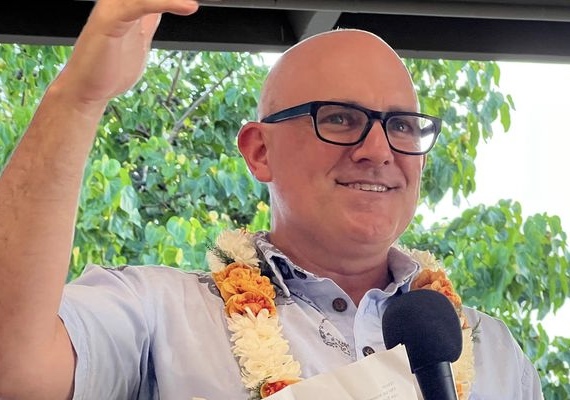The Shifted Energy experience
"I think it comes down to representation," says Forest Frizzell, CEO and co-founder of Shifted Energy. "Representation matters."
Shifted Energy, a Hawaii-based Elemental Excelerator portfolio company, was founded in 2015, coming out of a productive partnership between local nonprofit volunteer organization Kanu Hawaii and ratepayer-funded utility efficiency program Hawaii Energy.
The fundamental innovation of the startup? Using electric hot water heaters as batteries that can be collectively managed to address shifting power demands, stabilize power grids, and benefitting homeowners and local companies in the process.
Shifted Energy signed the EDICT Pledge, and this summer is working with an intern from the sustainability graduate degree program at Hawaii Pacific University. Frizzell says he is fully on-board with the EDICT mission.
"If everybody in your employee pool or your board room looks exactly the same, if they've come from really similar economic backgrounds and education backgrounds, as a company it will be really difficult for you to build for or respond to everybody within your ecosystem," he explains. "Having diverse voices throughout multiple levels of the organization absolutely helps to inform whatever it is that you're building."
Frizzell acknowledges that the disparities are different in Hawaii than they are in most other U.S. states, where ethnic diversity is high.
"The companies I've worked with are normally all Hawaii-based companies, and so I think maybe you have a little bit of a less of an issue with that," he says. "I think depending on the industry, where where we fall short oftentimes is more on gender diversity."
That view is validated by his career in the tech and energy space.
"Because in Hawaii, you might have at least the ethnic diversity built in, I think that across the board — in Hawaii and abroad — there's been a push to try and be more gender diverse in the sectors that I'm working in especially," he says.
"Outside of Hawaii, then it's the opposite, I think you definitely have an issue with lack of representation both racially and for LGBT as well," he adds. "I haven't seen as much of a push for LGBT in Hawaii, actually but that's starting to change."
Even with Hawaii's strengths, Frizzell says he has never seen a local company declare that it doesn't have a problem with diversity.
"I think it'd be rare where people would publicly go on record and say, 'We've got no problem with this,'" he says. "I think you have to look at who says that they're going to put diversity inclusion programs together, and then you have to see change in the organization."
That change will necessarily take time, Frizzell notes.
"The proof is in the action," he says. "Have you actually taken the action to make a more diverse workforce?"
Taking action can be scary, he admits.
"There needs to be a commitment to enter spaces that that historically you might not have spent time with, and that might be uncomfortable," he says. "That's okay, there should be some uncomfortableness to it, because it's been overlooked."
On the plus side, Frizzell says that attention to diversity has been instructive in the evolution of his company.
"Historically, energy solutions have gone to wealthy people, someone that owns a single family home, someone that can put solar on their roof and has a garage to park an EV and place a battery in," he says. "But if you're a renter, if you're lower on the socio economic scale, if you live in a multifamily building, historically, there hasn't been a lot of opportunity for you."
Frizzell credits the makeup of his company for the recent push to be more inclusive and work with different communities.
"That goes back to why I say representation matters," he says. You don’t hear that voice if everybody looks the same and comes from the same economic background."
Even in the focused space where Shifted Energy operates, there are historic trust issues, Frizzell notes.
"Frontline communities are where the transfer stations are, it's where the power plants go, because there's less agency — you don't see a power plant in a wealthy neighborhood," he explains. "If you haven't been included in the planning, in designing what the future looks like, then you don't see yourself as part of it, and you're most likely not going to contribute to it."
Read the entire post at Hawaii Buletin.
